Persuasive Business Letter
[Your Name]
[Your Title]
[Your Company Name]
[Your Address]
[City, State, ZIP Code]
[Email Address]
[Phone Number]
[Date]
[Recipient's Name]
[Recipient's Title]
[Recipient's Company Name]
[Recipient's Address]
[City, State, ZIP Code]
Dear [Recipient's Name],
I hope this letter finds you well. I am writing to share an exciting opportunity that I believe can greatly benefit [Recipient's Company Name]. At [Your Company Name], we have developed a groundbreaking [Product/Service] that has the potential to revolutionize [Industry/Market].
Our [Product/Service] offers a unique blend of innovation, efficiency, and quality that can address [specific pain points or challenges in recipient's industry/market]. With a track record of [mention any impressive achievements, awards, or partnerships], we are confident in the value that our solution can bring to [Recipient's Company Name].
Here are a few key benefits you can expect from our [Product/Service]:
1. [Benefit 1]: Describe how this benefit directly addresses a pain point or improves a process.
2. [Benefit 2]: Highlight another advantage that sets your product/service apart.
3. [Benefit 3]: Emphasize a third benefit, focusing on the positive impact it will have.
Furthermore, we understand the importance of a seamless integration process. Our dedicated team will work closely with your team to ensure a smooth transition and provide comprehensive support every step of the way.
I would love the opportunity to discuss how [Your Company Name] can contribute to the success and growth of [Recipient's Company Name]. Please let me know a convenient time for a brief call or meeting. You can reach me at [Your Phone Number] or [Your Email Address].
Thank you for considering this partnership. We look forward to the possibility of working together to achieve remarkable results.
Sincerely,
[Your Name]
[Your Title]
[Your Company Name]
Enclosure: [Include any relevant documents or materials, if applicable]
Formal Persuasive Business Letter for Client Acquisition
Subject: Unlocking Exceptional Value for Your Business
Dear [Client Name],
We are pleased to present our proposal to collaborate with [Your Company Name]. Our innovative solutions in [Product/Service Area] are designed to optimize your operations and enhance profitability.
We would welcome the opportunity to discuss a partnership that can deliver measurable benefits. Please find the attached proposal for your review, and let us know a convenient time for a meeting.
Thank you for considering this opportunity.
Sincerely,
[Your Name]
[Title]
[Company Name]
Creative Persuasive Letter to Encourage Business Partnership
Subject: Let’s Create Something Extraordinary Together
Hello [Client Name],
At [Company Name], we believe great things happen when visionary companies collaborate. Our team offers customized [Product/Service] solutions that can accelerate your business growth.
We would love to explore how we can bring added value to your organization. Can we schedule a brief call next week to discuss this exciting opportunity?
Warm regards,
[Your Name]
Casual Persuasive Business Email
Hi [Client Name],
I hope you’re doing well! I wanted to share an idea on how [Company Name] can help [Client Company] achieve its goals faster with our [Product/Service].
If you’re open to it, let’s set up a quick chat to go over the possibilities. I’m confident it will be worth your time.
Best,
[Your Name]
Heartfelt Persuasive Letter for Investor Engagement
Subject: Join Us on a Journey of Growth and Impact
Dear [Investor Name],
We are excited to invite you to partner with [Company Name] in our upcoming venture. Your expertise and support can help us drive innovation and achieve remarkable results in [Industry/Field].
We are confident this collaboration will be mutually rewarding and look forward to discussing this opportunity at your earliest convenience.
Sincerely,
[Your Name]
[Title]
[Company Name]
Provisional Persuasive Letter for Tentative Collaboration
Subject: Tentative Proposal for Collaboration
Dear [Client Name],
We are reaching out with a preliminary proposal for potential collaboration between [Company Name] and [Client Company]. Our goal is to explore areas where our services can add value.
We would appreciate the opportunity to discuss this idea further and finalize details once we receive your initial feedback.
Best regards,
[Your Name]
Urgent / Quick Persuasive Business Letter
Subject: Immediate Opportunity to Boost Your Business
Dear [Client Name],
We have identified a time-sensitive opportunity that could significantly enhance [Client Company]'s performance in [Area]. Our team at [Company Name] is ready to implement a tailored solution quickly.
Please let us know a suitable time to discuss this opportunity so we can take action promptly.
Thank you,
[Your Name]
Official Persuasive Letter for Government Contract Proposal
Subject: Proposal Submission for [Project/Contract Name]
Honorable [Recipient Name],
We are submitting our proposal for the [Project/Contract Name] in response to your requirements. [Company Name] is committed to delivering high-quality solutions with efficiency and transparency.
We request an opportunity to present our capabilities in person and discuss how we can meet your objectives effectively.
Respectfully,
[Your Name]
[Title]
[Company Name]
What is a Persuasive Business Letter and Why It Matters
A Persuasive Business Letter is a written communication aimed at influencing the recipient to take a specific action, such as approving a proposal, entering into a partnership, or purchasing a product.
Its purpose is to present compelling arguments, benefits, and value propositions in a professional, clear, and convincing manner.
Who Should Send a Persuasive Business Letter
- Business development executives
- Sales and marketing managers
- Entrepreneurs and startup founders
- Account managers and client relationship specialists
- Any professional seeking to influence decisions in a business context
Who Should Receive a Persuasive Business Letter
- Potential clients or customers
- Investors and venture partners
- Business partners or suppliers
- Government or institutional decision-makers
- Internal stakeholders requiring approval or support
When to Send a Persuasive Business Letter
- Before pitching a product or service to new clients
- When proposing partnerships or collaborations
- During fundraising or investment opportunities
- When seeking approval for internal business initiatives
- Ahead of important negotiations or contract discussions
How to Write a Persuasive Business Letter
- Begin with a clear subject line summarizing the purpose
- Introduce the sender and reason for writing
- Highlight benefits, value propositions, or unique selling points
- Provide supporting details, data, or testimonials
- Include a clear call-to-action or next steps
- Conclude with a polite and confident closing
- Choose email for rapid outreach or printed letter for formal contexts
How Many Recipients or Copies Are Typically Needed
- Usually addressed to a primary decision-maker
- CC relevant stakeholders if necessary
- Retain a copy for internal records
- For mass outreach, personalize letters as much as possible
Requirements and Prerequisites Before Writing
- Research the recipient’s business, goals, and challenges
- Clarify your own objectives and key messages
- Prepare supporting data, testimonials, or case studies
- Choose the most effective tone and format for the recipient
Formatting and Style Guidelines
- Length: Typically 1–2 pages or concise email
- Tone: Professional, confident, and courteous
- Style: Formal for official or high-level proposals, creative for marketing outreach
- Wording: Clear, persuasive, and benefit-oriented
- Mode: Email for speed, printed letter for formal presentation
- Etiquette: Avoid exaggeration; maintain integrity and professionalism
After Sending a Persuasive Business Letter
- Follow up within a reasonable timeframe (usually 3–7 days)
- Track responses and schedule meetings or calls
- Provide additional information if requested
- Adjust strategy based on feedback received
Pros and Cons of Sending a Persuasive Business Letter
Pros:
- Formalizes communication and leaves a written record
- Can be personalized to target specific recipients
- Demonstrates professionalism and strategic thinking
Cons:
- May be ignored if not well-crafted or compelling
- Requires research and preparation time
- Overly aggressive tone can be off-putting
Common Mistakes to Avoid
- Using generic or overly vague content
- Failing to highlight benefits to the recipient
- Neglecting proper formatting and professional tone
- Sending without proofreading or reviewing key details
- Ignoring follow-up opportunities
Elements and Structure of a Persuasive Business Letter
- Subject line or heading
- Salutation addressing the recipient correctly
- Introduction explaining the purpose
- Main body with arguments, benefits, or solutions
- Supporting evidence or data
- Call-to-action with clear next steps
- Closing statement expressing anticipation or confidence
- Signature and title
- Optional attachments: proposals, brochures, or supporting documents
Tricks and Tips for Effective Persuasive Letters
- Personalize each letter for maximum impact
- Focus on benefits to the recipient, not just features
- Keep language concise and engaging
- Use bullet points or subheadings for clarity
- Include testimonials, case studies, or data to support claims
Compare and Contrast With Other Business Communications
- Persuasive Letter vs. Informational Letter: Persuasive letters aim to influence decisions; informational letters simply convey facts
- Email vs. Printed Letter: Emails are faster and convenient; printed letters convey formality and authority
- Internal Proposal vs. External Persuasion: Internal letters often focus on approval or resource allocation, while external letters aim to win clients or partnerships
Does a Persuasive Business Letter Require Attestation or Authorization
- Typically, no attestation is required for general business proposals
- Official letters to government agencies or formal contracts may require letterhead, signature, or executive authorization
- Internal persuasive letters may need managerial approval before sending

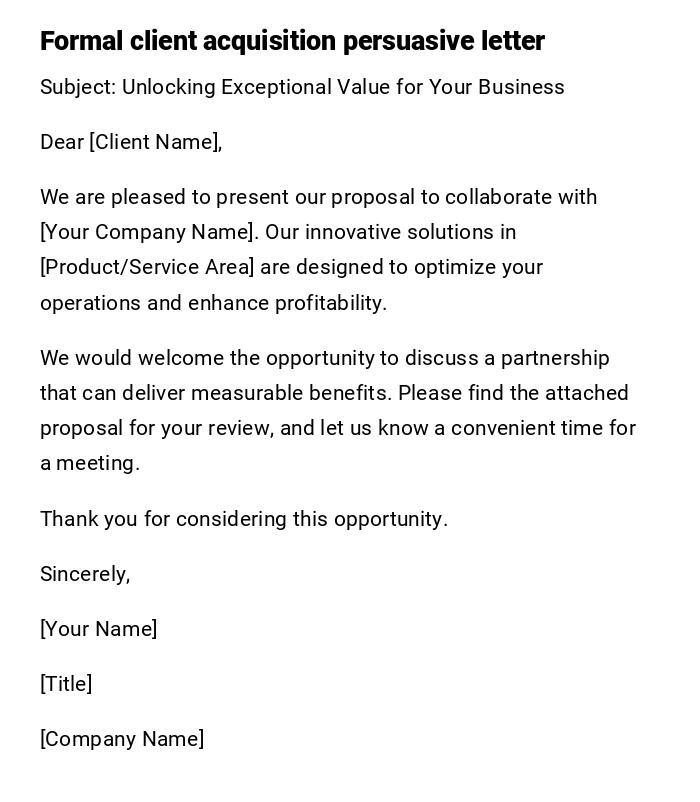
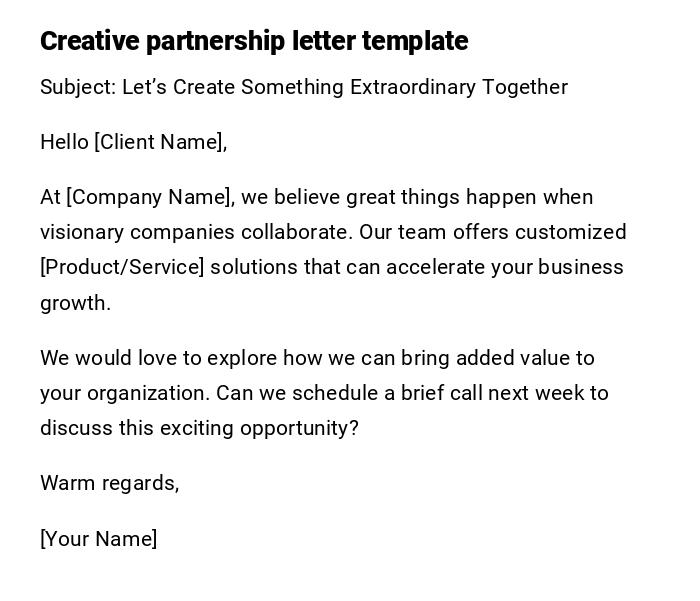
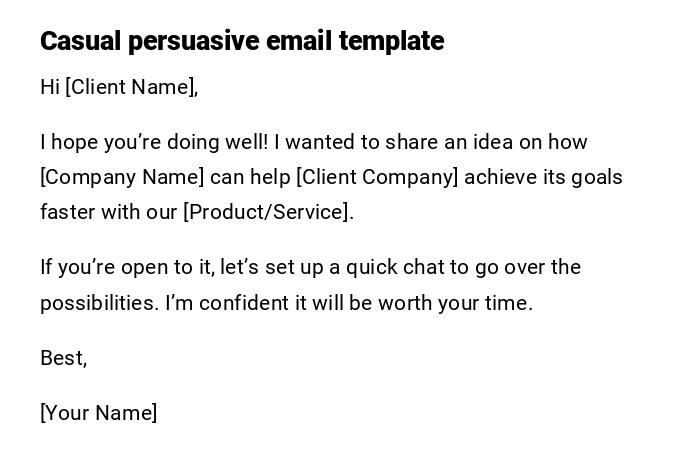
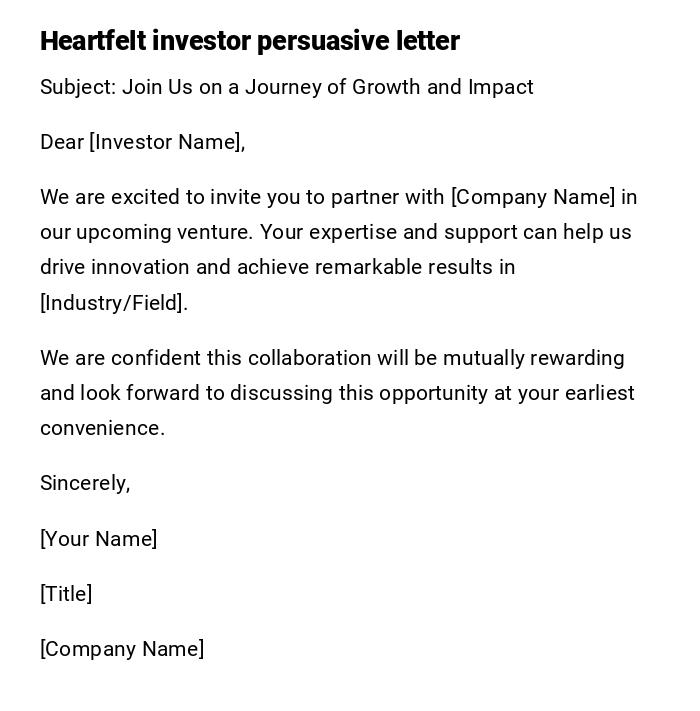
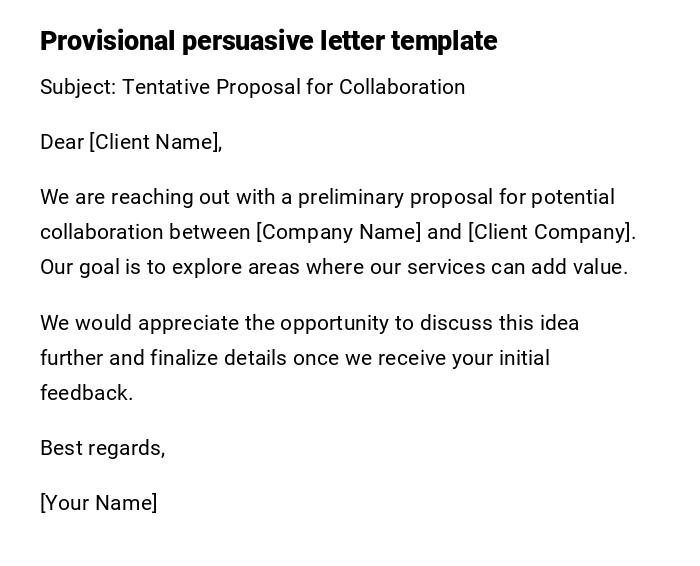
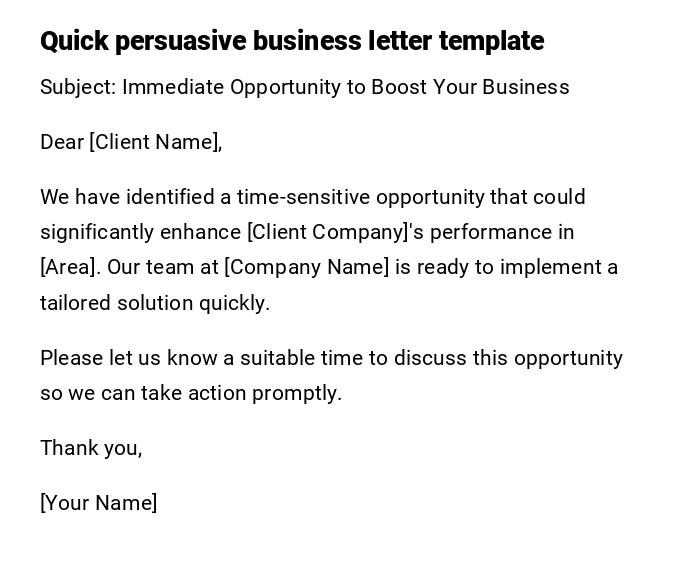
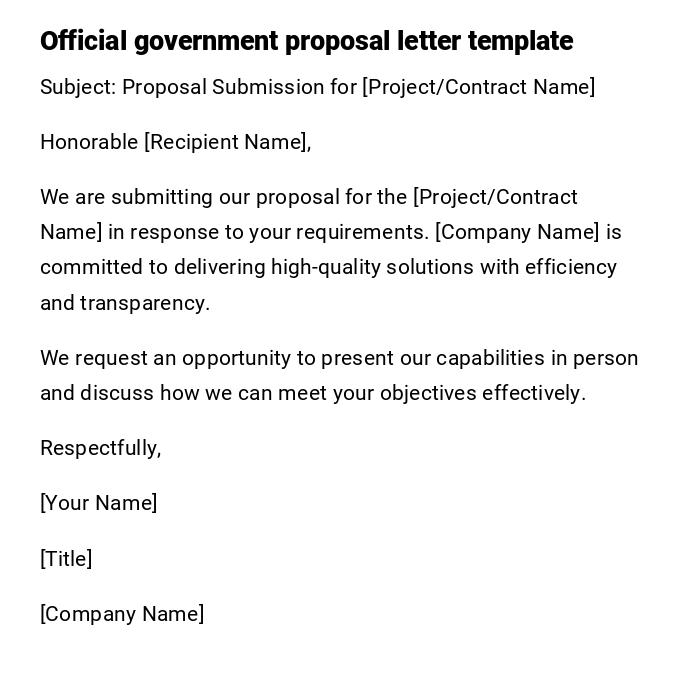

 Download Word Doc
Download Word Doc
 Download PDF
Download PDF